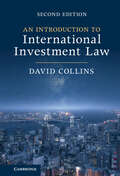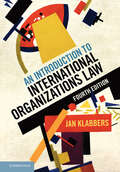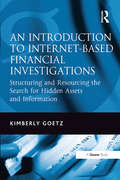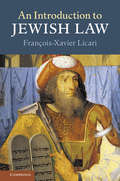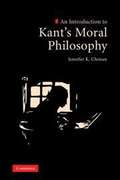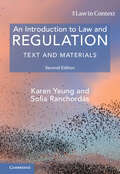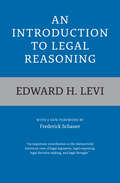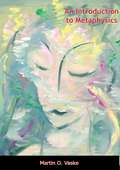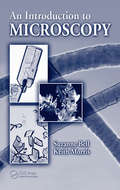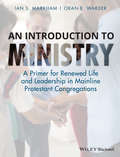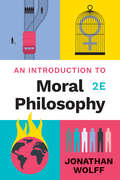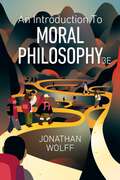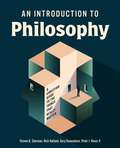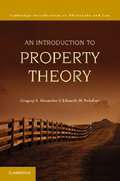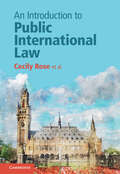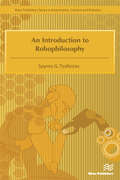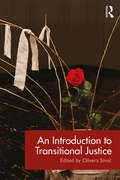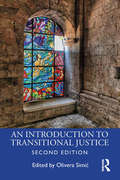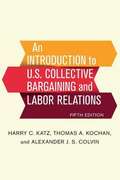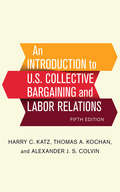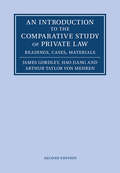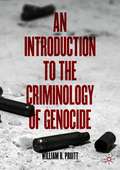- Table View
- List View
An Introduction to International Investment Law
by David CollinsThis insightful and accessible introduction provides students and practitioners with a comprehensive overview of the increasingly important discipline of international investment law. Focusing primarily on the legal principles contained in the growing body of international investment agreements, this book covers the core concepts of the discipline, with attention given to their relation to each other and to the manner which they have developed through arbitration case law. The context of each legal principle is explored, along with a consideration of some of the major debates and emerging criticisms. Avoiding extensive case extracts, this book adopts an engaging and succinct narrative style which allows readers to advance their understanding of the topic while examining the legal principles with academic rigour and discerning commentary.
An Introduction to International Organizations Law
by Jan KlabbersThe fourth edition of this market-leading textbook offers students a clear framework for understanding the practice and logic of International Organizations Law. It is structured around the three defining relationships IOs engage in – namely, with their member states, with their organs and staff, and with the outside world. These different dynamics give rise to different concerns, which each help to explain the logic behind international institutional law. The text also discusses the essential topics of the law of IOs, including powers and finances, privileges and immunities, institutional structures, and accountability. By demonstrating how the theory works in practice, with recent examples, students will observe the impact and significance of International Organizations Law. Updated with the latest case law and literature, this new edition also contains discussions of the withdrawal of Israel and the US from UNESCO, Brexit, and the Covid-19 pandemic, and how these affect the law of international organizations.
An Introduction to Internet-Based Financial Investigations: Structuring and Resourcing the Search for Hidden Assets and Information
by Kimberly GoetzIncreasingly, employees of regulatory bodies, law enforcement agencies and others who are not trained forensic accountants or experienced investigators find themselves responsible for conducting what amount to financial investigations. An engineer who oversees the cleanup of a toxic waste site might need to track down the former owners of the site to find the polluter. Perhaps the applicable licensing agency receives a complaint that an attorney mishandled a client's money. Maybe it's the attorney who needs help finding the assets with which a client's former spouse has absconded. Training in investigation techniques tends to be very limited for many employees. Training on how to find information without incurring significant expense is virtually nonexistent. This book helps fill the void. An Introduction to Internet-Based Financial Investigations will help anyone who conducts financial investigations as part of their job to reduce their dependence on trial and error by showing them where and how to look. Using clear sections describing how to approach an investigation, including the ethical perspective; what to look for and what you find; what free and low cost internet resources are available to support investigations; and how to assemble and present the results of investigations, Kimberly Goetz guides students and beginning investigators through the complex world of financial investigations.
An Introduction to Islamic Law
by Wael B. HallaqThe study of Islamic law can be a forbidding prospect for those entering the field for the first time. Wael Hallaq, a leading scholar and practitioner of Islamic law, guides students through the intricacies of the subject in this absorbing introduction. The first half of the book is devoted to a discussion of Islamic law in its pre-modern natural habitat. The second part explains how the law was transformed and ultimately dismantled during the colonial period. In the final chapters, the author charts recent developments and the struggles of the Islamists to negotiate changes which have seen the law emerge as a primarily textual entity focused on fixed punishments and ritual requirements. The book, which includes a chronology, a glossary of key terms, and lists of further reading, will be the first stop for those who wish to understand the fundamentals of Islamic law, its practices and history.
An Introduction to Jewish Law
by François-Xavier LicariJewish law is a singular legal system that has been evolving for generations. Often conflated with Biblical law or Israeli law, Jewish law needs to be studied in its own right. An Introduction to Jewish Law expounds the general structure of Jewish law and presents the cardinal principles of this religious legal system. An introduction to modern Jewish law as it applies to the daily life of Jews around the world, this volume presents Jewish law in a way that answers all the questions that a student of comparative law would ask when encountering an unfamiliar legal system. Sources of Jewish law such as revelation, rabbinical and communal legislation, judicial decisions, and legal reasoning are defined and analyzed, and the authority of who decides what Jewish law is and why their decisions are binding is investigated.
An Introduction to Kant'S Moral Philosophy
by Jennifer K. UlemanImmanuel Kant's moral philosophy is one of the most distinctive achievements of the European Enlightenment. At its heart lies what Kant called the 'strange thing': the free, rational, human will. This introduction explores the basis of Kant's anti-naturalist, secular, humanist vision of the human good. Moving from a sketch of the Kantian will, with all its component parts and attributes, to Kant's canonical arguments for his categorical imperative, this introduction shows why Kant thought his moral law the best summary expression of both his own philosophical work on morality and his readers' deepest shared convictions about the good. Kant's central tenets, key arguments, and core values are presented in an accessible and engaging way, making this book ideal for anyone eager to explore the fundamentals of Kant's moral philosophy.
An Introduction to Law
by Phil HarrisNesta's life is thrown into upheaval when she gets involved in charity work thinking that it might be a cool way to meet people (mainly boys). But as her eyes are opened to the plight of the world, she begins to genuinely want to get involved and help others. On top of this, Nesta meets William, a boy who questions her motives. At times, she's convinced he hates her and the feeling is mutual. But Izzie, Lucy and T. J. think it is something more like love.
An Introduction to Law and Regulation: Text and Materials (Law in Context)
by Karen Yeung Sofia RanchordásContemporary life relies on regulation. The quality and safety of the water we drink, the food we eat, and the social media applications we use are all governed by multiple regulatory regimes. Although rooted in law, regulation is a multidisciplinary endeavour. Debates about regulation, particularly in the face of rapid change and the emergence of new 'risks', are now commonplace. Despite extensive scholarship, regulation is often poorly understood, even by policy-makers, with unintended and even disastrous consequences. This book offers a critical introduction to core theories, concepts, methods, tools, and techniques of regulation, including regulatory policy, instruments, enforcement, compliance, accountability and legitimacy. Weaving extracts from texts drawn from many disciplines with accessible commentary, it introduces this important field to students, scholars, and practitioners in a scholarly yet accessible and engaging manner with discussion questions and additional readings for those seeking to deepen their knowledge.
An Introduction to Legal Reasoning
by Edward H. LeviThis volume will be of interest and value to students of logic, ethics, and political philosophy, as well as to members of the legal profession and to everyone concerned with problems of government and jurisprudence. By citing a large number of cases, the author makes his presentation of the processes of judicial interpretation particularly lucid.
An Introduction to Metaphysics
by Martin O. VaskeA clear, solid and succinct textbook in metaphysics, An Introduction to Metaphysics, which was first published in 1963, begins with a chapter on the existence of all things (including ourselves) and then proceeds to discuss the subjects of changing existents; participating, multiple existents; efficient causes; final and exemplary causes; the Primary Cause; the transcendental properties; categories of limited being; and the analogy of being.
An Introduction to Microscopy
by Suzanne Bell Keith MorrisMicroscopy, which has served as a fundamental scientific technique for centuries, remains an invaluable tool in chemistry, biology, healthcare, and forensics. Increasingly, it is being integrated into modern chemical instrumentation and is of value as a powerful analytical tool across many scientific disciplines. Designed to serve as a primary reso
An Introduction to Ministry: A Primer for Renewed Life and Leadership in Mainline Protestant Congregations
by Ian S. Markham Oran E. WarderAn Introduction to Ministry is a comprehensive and ecumenical introduction to the craft of ministry for ministers, pastors, and priests that make up the mainline denominations in the United States. Ecumenically-focused, It offers a grounded account of ministry, covering areas such as vocation, congregational leadership, and cultivation of skills for an effective ministry. Covers the key components of the M.Div. curriculum, offering a map and guide to the central skills and issues in training Explores the areas of vocation, skills for ministry, and issues around congregational leadership Each topic ends with an annotated bibliography providing an indispensable gateway to further study Helps students understand both the distinctive approach of their denomination and the relationship of that approach to other mainline denominations Advocates and defends a generous understanding of the Christian tradition in its openness and commitment to broad conversation
An Introduction to Moral Philosophy (Second Edition)
by Jonathan WolffThe most contemporary and applicable introduction to moral philosophy From respected philosopher and writer Jonathan Wolff, this brief introduction to ethics stimulates independent thought, emphasizes real-world examples, and provides clear and engaging introductions to key moral theories and the thinkers behind them. The new Second Edition offers expanded coverage of moral reasoning, as well as two thoughtful and contemporary new chapters on applying moral philosophy and the ethics of race. A companion primary source collection, Readings in Moral Philosophy, amplifies issues discussed in the text, connecting them to problems in applied ethics.
An Introduction to Moral Philosophy (Third Edition)
by Jonathan WolffEmpower students to think critically about ethical theories and moral dilemmas. From his influential scholarship to his popular writings to his appearances on the BBC, Jonathan Wolff has a knack for making moral philosophy vivid and exciting for any audience. In An Introduction to Moral Philosophy, he wields this talent to deliver a text that students enjoy reading. In addition to surveying the basics of ethical theory and critical thinking, Wolff guides students through debates about some of today’s most urgent moral issues, including the ethics of race, gender, artificial intelligence, and public health. The text invites students to think for themselves about real-world issues and provides them with an accurate, appealing sense of what moral philosophy is all about. This purchase offers access to the digital ebook only.
An Introduction to Philosophy: A Christian Guide to the Things that Really Matter
by Steven B. Sherman Richard A. Holland Gary S. Osmundsen Peter J. RasorDesigned for students in Christian colleges and seminaries, An Introduction to Philosophy surveys the four main areas of philosophy - logic, metaphysics, epistemology, and ethics - in an accessible and engaging manner. Yet it also covers important topics sometimes left unaddressed in introductions, including:why philosophy matters in our daycritical thinking and intellectual virtuea brief history of philosophyphilosophical hermeneuticsthe relationship between philosophy, faith, and worldviewreligious epistemologybioethics, sexual ethics, other types of ethicsa Christian philosophy of lifeGrounded in the Christian intellectual tradition, each chapter in An Introduction to Philosophy includes student-friendly features such as chapter summaries, explanatory sidebars, reflection questions, vocabulary words and definitions, and suggestions for further reading. Professors and students will find it to be a broad and useful overview, perfect for undergraduate and seminary students alike.
An Introduction to Property Theory
by Gregory S. Alexander Eduardo M. PeñalverThis book surveys the leading modern theories of property - Lockean, libertarian, utilitarian/law-and-economics, personhood, Kantian and human flourishing - and then applies those theories to concrete contexts in which property issues have been especially controversial. These include redistribution, the right to exclude, regulatory takings, eminent domain and intellectual property. The book highlights the Aristotelian human flourishing theory of property, providing the most comprehensive and accessible introduction to that theory to date. The book's goal is neither to cover every conceivable theory nor to discuss every possible facet of the theories covered. Instead, it aims to make the major property theories comprehensible to beginners, without sacrificing accuracy or sophistication. The book will be of particular interest to students seeking an accessible introduction to contemporary theories of property, but even specialists will benefit from the book's lucid descriptions of contemporary debates.
An Introduction to Public International Law
by Nico Schrijver Robert Heinsch Cecily Rose Niels Blokker Daniëlla Dam-de Jong Simone van den Driest Erik KoppeWritten for students working in a range of disciplines, this textbook provides an accessible, balanced, and nuanced introduction to the field of public international law. It explains the basic concepts and legal frameworks of public international law while acknowledging the field's inherent complexities and controversies. Featuring numerous carefully chosen and clearly explained examples, it demonstrates how the law applies in practice, and public international law's pervasive influence on world affairs, both past and present. Aiming not to over-emphasize any particular domestic jurisprudence or research interest, this textbook offers a global overview of public international law that will be highly valuable to any student new to the study of this very significant field.
An Introduction to Robophilosophy Cognition, Intelligence, Autonomy, Consciousness, Conscience, and Ethics: Cognition, Intelligence, Autonomy, Consciousness, Conscience And Ethics (River Publishers Series In Automation, Control, And Robotics Is A Series Of Comprehensive Academic And Professional Books Which Focus On The Theory And Applications Of Automation, Control And Robotics. The Series Focuses On Topics Ranging From The Theory And Use Of Control Systems, Automation Engineering, Robotics And Intelligent Machines. Books Published In The Series Include Research Monographs,)
by Spyros G. TzafestasModern robots have arrived at a very matured state both in their mechanical / control aspects and their mental aspects. An Introduction to Robophilosophy explores the philosophical questions that arise in the development, creation, and use of mental – anthropomorphic and zoomorphic- robots that are capable of semiautonomous / autonomous operation, decision making and human-like action, being able to socially interact with humans and exhibit behavior similar to human beings or animals. Coverage first presents fundamental concepts, and an overview of philosophy, philosophy of science, and philosophy of technology. The six principal mental capabilities of modern robots, namely cognition, intelligence, autonomy, consciousness, conscience, and ethics are then studied from a philosophical point of view. They actually represent the product of technological embodiment of cognitive features to robots. Overall, readers are provided a consolidated thorough investigation of the philosophical aspects of these mental capabilities when embedded to robots. This book will serve as an ideal educational source in engineering and robotics courses as well as an introductory reference for researchers in the field of robotics, and it includes a rich bibliography.
An Introduction to Transitional Justice
by Olivera SimicAn Introduction to Transitional Justice provides the first comprehensive overview of transitional justice judicial and non-judicial measures implemented by societies to redress legacies of massive human rights abuse. Written by some of the leading experts in the field it takes a broad, interdisciplinary approach to the subject, addressing the dominant transitional justice mechanisms as well as key themes and challenges faced by scholars and practitioners. Using a wide historic and geographic range of case studies to illustrate key concepts and debates, and featuring discussion questions and suggestions for further reading, this is an essential introduction to the subject for students.
An Introduction to Transitional Justice
by Olivera SimićThe Second Edition of An Introduction to Transitional Justice provides a comprehensive overview of transitional justice judicial and non-judicial measures implemented by societies to redress legacies of massive human rights abuse. Written by some of the leading experts in the field, it takes a broad, interdisciplinary approach to the subject, addressing the dominant transitional justice mechanisms as well as key themes and challenges faced by scholars and practitioners. Using a wide historic and geographic range of case studies to illustrate key concepts and debates, and featuring discussion questions and suggestions for further reading, this is an essential introduction to the subject for students.
An Introduction to U. S. Collective Bargaining and Labor Relations (5th Edition)
by Thomas A. Kochan Harry C. Katz Alexander J. S. ColvinThis comprehensive textbook provides an introduction to collective bargaining and labor relations with a focus on developments in the United States. It is appropriate for students, policy analysts, and labor relations professionals including unionists, managers, and neutrals. A three-tiered strategic choice framework unifies the text, and the authors' thorough grounding in labor history and labor law assists students in learning the basics. In addition to traditional labor relations, the authors address emerging forms of collective representation and movements that address income inequality in novel ways.
An Introduction to U.S. Collective Bargaining and Labor Relations
by Thomas A. Kochan Alexander J. Colvin Harry C. KatzThis comprehensive textbook provides an introduction to collective bargaining and labor relations with a focus on developments in the United States. It is appropriate for students, policy analysts, and labor relations professionals including unionists, managers, and neutrals. A three-tiered strategic choice framework unifies the text, and the authors’ thorough grounding in labor history and labor law assists students in learning the basics. In addition to traditional labor relations, the authors address emerging forms of collective representation and movements that address income inequality in novel ways.Harry C. Katz, Thomas A. Kochan, and Alexander J. S. Colvin provide numerous contemporary illustrations of business and union strategies. They consider the processes of contract negotiation and contract administration with frequent comparisons to nonunion practices and developments, and a full chapter is devoted to special aspects of the public sector. An Introduction to U.S. Collective Bargaining and Labor Relations has an international scope, covering labor rights issues associated with the global supply chain as well as the growing influence of NGOs and cross-national unionism. The authors also compare how labor relations systems in Germany, Japan, China, India, Brazil, and South Africa compare to practices in the United States.The textbook is supplemented by a website (ilr.cornell.edu/scheinman-institute) that features an extensive Instructor’s Manual with a test bank, PowerPoint chapter outlines, mock bargaining exercises, organizing cases, grievance cases, and classroom-ready current events materials.
An Introduction to the Comparative Study of Private Law
by James Gordley Arthur Taylor von MehrenThis collection of readings sets out the two fundamental distinctions between common and civil law, namely that the former originated in the English courts, the latter in the Roman legal tradition, and that the common law is based on judicial decisions whereas codes form the basis of modern civil law. The core of book consists of cases, statutes and code provisions shaping the doctrines central to the law of property, tort, contract and unjust enrichment in the United States, England, France and Germany. These materials provide a road map of the law of each, allowing the reader to consider how doctrines differ, how these differences emerged, and whether the underlying problems and solutions are common to all. They also allow for comparison to be made between the approaches of common and civil law, and to consider the extent to which they depend on the origin and nature of the law.
An Introduction to the Comparative Study of Private Law: Readings, Cases, Materials
by James Gordley Hao Jiang Arthur Taylor von MehrenThis collection of readings places side by side the principal doctrines of contracts, torts, unjust enrichment, and property in the cases of the United States, England, France, Germany and China. It presents code provisions, cases, and other legal materials that describe the law in force, and places each doctrine in its historical context to enable an understanding of the development of law as an ongoing process, in which the resolution of current issues depends upon how past issues were resolved. It both provides a road map of the private law of these jurisdictions, and illustrates how private law has been shaped by history, by the effort to solve common problems, and by differences in culture. This new edition reflects changes in the law, and includes the addition of Chinese Law as a comparative study.
An Introduction to the Criminology of Genocide
by William R. PruittThis textbook provides an accessible and interdisciplinary introduction to genocide with an emphasis on the criminal aspect of genocide. It draws on sociological, political, and historical concepts to discuss how they contribute to our understanding of genocide as an international crime. It walks students through the evolution of genocide as a criminal act and the legal responses available using case studies to demonstrate how concepts work in action. It combines Criminology and Law, arguing that Criminology can help explain the ‘why and how’ while Law can explain the responses to crime. This textbook includes a chapter on genocide denial as well as discussion questions at the end of the chapters, boxed examples, and further reading. It speaks to students in Criminology, Law, Socio-Legal Studies, and beyond, as well as to practitioners in the criminal justice field.
